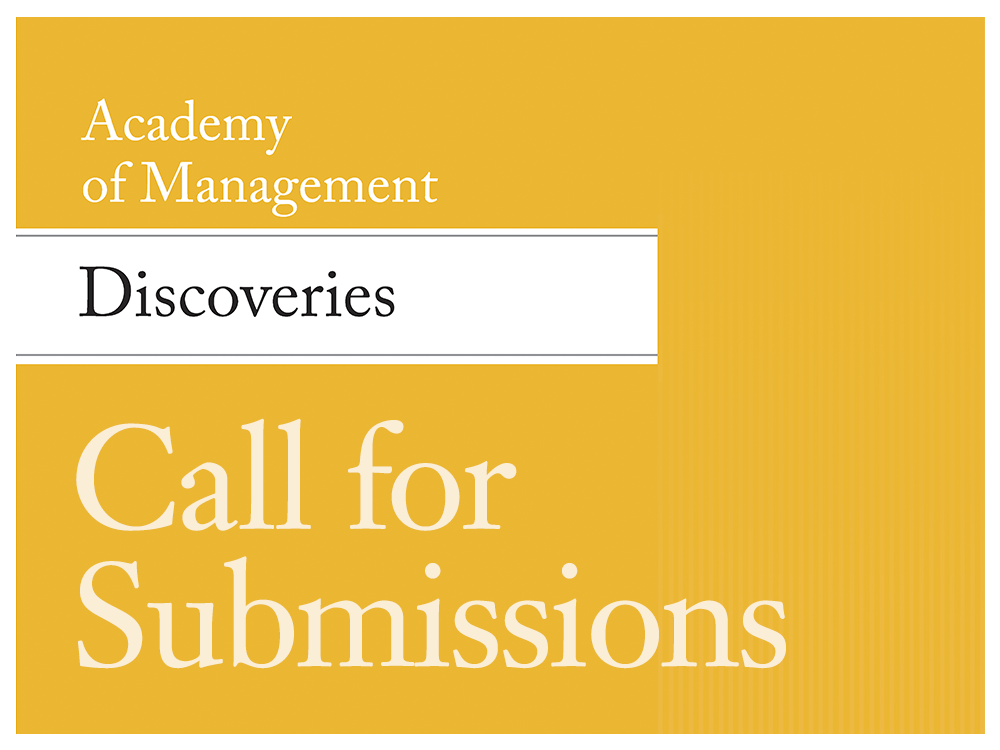AMD Virtual Presentation and Proposal Workshop
Academy of Management Discoveries (AMD)
Virtual Presentation and Proposal Workshop
Fall 2021
Dr. Kevin Rockmann, Editor-in-Chief
The purpose of this two-part virtual workshop is to learn about AMD and to then create a proposal for a project that follows the AMD mission and focus, which will then be reviewed by the AMD Editor and discussed.
Part 1: 1 October 2021, 09:00–10:30 ET (GMT/UTC-5)
Registration Required
Dr. Kevin Rockmann, along other members of the editorial team, will host a 90-minute discussion on how to publish in AMD, the premier journal for empirical exploration in management. Topics will include the unique features of the journal, innovations at the journal, and how best to craft an article for the journal. There will be plenty of time for questions from attendees.
At the end of this session, attendees will be invited to submit a proposal for an AMD-inspired empirical exploration, which will be discussed the following month in Part 2. While the proposals will not appear in the journal, the goal is to provide useful feedback so that proposals will lead to future AMD submissions and publications.
For Part 1, held on 1 October 2021, register here by 27 September 2021.
Following Part 1 of the workshop, proposals must be submitted by 8 November 2021 to AMD Editor-in-Chief Kevin Rockmann at krockman@gmu.edu.
Part 2: 12 November 2021, 09:00-11:00 ET (GMT/UTC-5)
By Invitation Only
Part 2 will be an interactive discussion for those who have attended (or viewed) Part 1 and have submitted their proposals.
Proposal Guidelines:
- Proposals should be no longer than 6 double-spaced pages of text.
- Proposals should have a title but no abstract.
- Proposals should include a section on each of the following:
- The compelling phenomenon of interest
In this section, the proposal should clearly outline the phenomenon the researcher is interested in exploring. Exemplar quotes/examples/experiences can and should be used to enhance this description. The goal is to clearly situate the reader in the context where the phenomenon is present. The proposal should demonstrate why this particular phenomenon is compelling for a management audience. - How existing theory fails to explain the phenomenon
In this section, the proposal should include prior research related to the phenomenon of interest. The goal here is to demonstrate why existing theory is absent, misguided, contradictory, or otherwise insufficient to explain the occurrence of the phenomenon. This section should end or otherwise contain one or more research questions. - The proposed methodology
AMD is a journal for empirical exploration. This section of the proposal should explain the proposed explorations and nature of the proposed data (if not already in hand). This may include, but is not limited to, the context, the participants, the datasets, and the variables. This section should also include a proposed analytical strategy. - Findings (if available)
If you have data already in hand, provide preliminary analyses and evidence of one or more discoveries. - The potential theoretical contributions
AMD is interested in papers that open new lines of inquiry. That is, an interesting or unexpected finding is not enough; the findings should have the ability to inform the phenomenon in such a way that other researchers want to go and study it. This section of the proposal should include a discussion as to how this research might open up new research endeavors.
- The compelling phenomenon of interest
Only those who have submitted proposals will be invited to Part 2, where participants will be able to briefly share their ideas, and one of the AMD facilitators will provide feedback. Time for discussion and networking between participants will also be provided.
Participants might find it useful to look at the following to get a better understanding of the various types of papers published in Academy of Management Discoveries:
Ameri, M., Rogers, S. E., Schur, L., & Kruse, D. (2020). No Room at the Inn? Disability Access in the New Sharing Economy. Academy of Management Discoveries, 6(2), 176-205.
Ertug, G., & Maoret, M. (2020). Do Coaches in the National Basketball Association Actually Display Racial Bias? A Replication and Extension. Academy of Management Discoveries, 6(2), 206-234.
Rockmann, K. W., & Pratt, M. G. (2015). Contagious Offsite Work and the Lonely Office: The Unintended Consequences of Distributed Work. Academy of Management Discoveries, 1(2): 150-164.
Whiteman, G., & Cooper, W. H. (2016). Decoupling Rape. Academy of Management Discoveries, 2(2): 115-154.
Kucukkeles, B., Ben-Menahem, S. M., & von Krogh, G. (2019). Small Numbers, Big Concerns: Practices and Organizational Arrangements in Rare Disease Drug Repurposing. Academy of Management Discoveries, 5(4), 415-437.
Belmi, P., & Pfeffer, J. (2015). How “Organization” Can Weaken the Norm of Reciprocity: The Effects of Attributions for Favors and a Calculative Mindset. Academy of Management Discoveries, 1(1): 36-57.
Salmon, E. D., Gelfand, M. J., Ting, H., Kraus, S., Gal, Y. A., & Fulmer, C. A. (2016). When Time Is Not Money: Why Americans May Lose Out at the Negotiation Table. Academy of Management Discoveries, 2(4): 349-367.
Bullough, A., & Renko, M. (2017). A Different Frame of Reference: Entrepreneurship and Gender Differences in the Perception of Danger. Academy of Management Discoveries, 3(1): 21-41.
If you have any questions about the above, please contact:
Michael Malgrande, mmalgrande@aom.org
